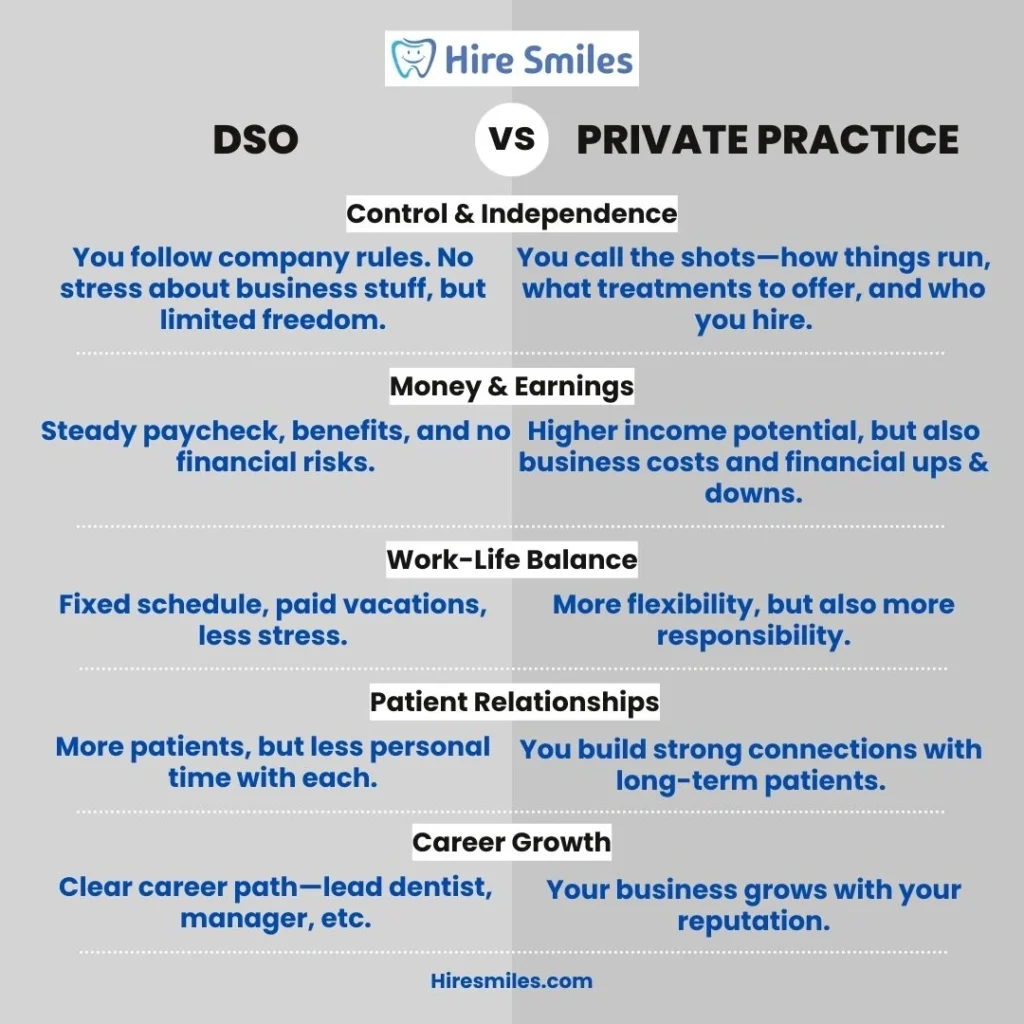If you’re thinking about becoming a dentist or maybe you’re already one and just wondering, “Should I join a DSO or start my private practice?” Either way, you’re in the right place. This is one of those decisions that can shape your entire career, kinda like choosing between coffee or tea every morning—except with way bigger consequences (and probably less caffeine).
Let’s break it all down, no confusing jargon, just the straight-up truth about DSO vs Private Practice so you can make the best decision for you.
What Even Is a DSO?
First things first, what is a DSO (Dental Service Organization)? Think of it like a dental franchise. A big company handles all the business-y stuff—billing, marketing, insurance, hiring—while you, the dentist, just focus on fixing teeth. You’re not the boss, but you do get a paycheck without worrying about running a business.
Perks of a DSO:
• No stressing over rent, payroll, or insurance claims.
• A steady paycheck (no guessing how much you’ll make this month!).
• Access to all the latest tech and tools—without dropping a fortune.
• Paid time off, benefits, and sometimes even student loan assistance (sweet deal, right?).
The Catch?
• Less control over how you run your practice.
• You might have quotas to hit (corporate wants those $$$).
• Limited flexibility—you probably won’t be setting your own hours or choosing your own supplies.
What About Private Practice?
Now, let’s talk about going solo. Private practice is like being your own boss. You call the shots, pick your own staff, and create your dream office vibe (seriously, you can even put a mini fridge stocked with snacks in there if you want).
Why Private Practice Rocks:
• You have total control over everything—treatment plans, pricing, patient experience.
• More potential for big $$$ in the long run.
• You build real relationships with your patients—they aren’t just numbers.
• Flexibility to create your own work-life balance (hello, long weekends!).
The Not-So-Great Parts?
• Business headaches—dealing with HR, insurance, payroll, and rent.
• High startup costs (think six figures to get rolling).
• No guaranteed paycheck—some months may be slow, and that’s stressful.
The Key Differences: DSO vs. Private Practice
1. Control & Independence
o With a DSO, you’re an employee following company policies and guidelines. You don’t get to choose the equipment, treatment plans, or office culture.
o In private practice, you have full control over everything—from the type of treatments you offer to the kind of vibe your office has. You’re the boss!
2. Earnings & Financial Risk
o DSOs offer a stable salary with predictable paychecks, which is great if you like security.
o Private practice can bring in significantly higher earnings over time, but income can fluctuate, especially in the early years. You’re also responsible for all business expenses.
3. Work-Life Balance
o DSOs usually offer fixed schedules, paid time off, and benefits like health insurance, making it easier to separate work from life.
o Private practice means flexibility—you can take days off when you want, but you also might find yourself working weekends or late nights to grow your business.
4. Startup Costs & Responsibilities
o A DSO requires zero upfront investment—just show up and start working.
o Private practice demands a significant financial investment (office space, staff salaries, marketing, equipment, etc.), but you build an asset that grows over time.
5. Patient Relationships & Office Culture
o In DSOs, patient interaction can feel more transactional because of quotas and efficiency targets.
o Private practice lets you build long-term relationships with your patients and establish a personalized experience.
6. Career Growth & Exit Strategy
o DSOs often have structured career paths, offering promotions to lead dentist or regional manager roles.
o Private practice owners can sell their practice for a significant profit when they’re ready to retire or move on.
So, Which One Should You Pick?
Honestly, it depends on what kind of dentist you want to be.
• If you just wanna show up, treat patients, and collect a paycheck—DSO is the way to go.
• If you dream of building your own brand, running a business, and making big money long-term—private practice is your best bet.
But here’s the kicker: You don’t have to decide right now. Many dentists start with a DSO to gain experience and save money, then jump into private practice when they’re ready.
FAQs:
1. Do DSOs pay more than private practice?
Short-term? Yes, because you get a stable paycheck. Long-term? Private practice wins if you grow your business well.
2. Is it hard to start a private practice?
Not gonna lie—it’s tough. But plenty of dentists do it and love the freedom it gives them.
3. Can I switch from a DSO to private practice later?
Absolutely. Tons of dentists start at a DSO and later open their own office.
4. Are DSOs bad for dentists?
Not necessarily. Some love the structured environment and the no-stress salary. Others feel it’s too corporate and restrictive.
Final Thoughts: What’s Right for YOU?
If you’re a go-getter who wants full control and doesn’t mind taking risks—private practice all the way. If you’d rather have a stress-free, stable job with no business headaches, a DSO might be your perfect match. Either way, being a dentist is a solid career choice, and you’ll be making a difference no matter which path you choose.
🚀 Need more guidance? Drop a comment below or reach out to our DSO recruitment consultancy! If you’re already in the game, share your experience—what do you think about the whole DSO vs Private Practice debate?
Infographic






